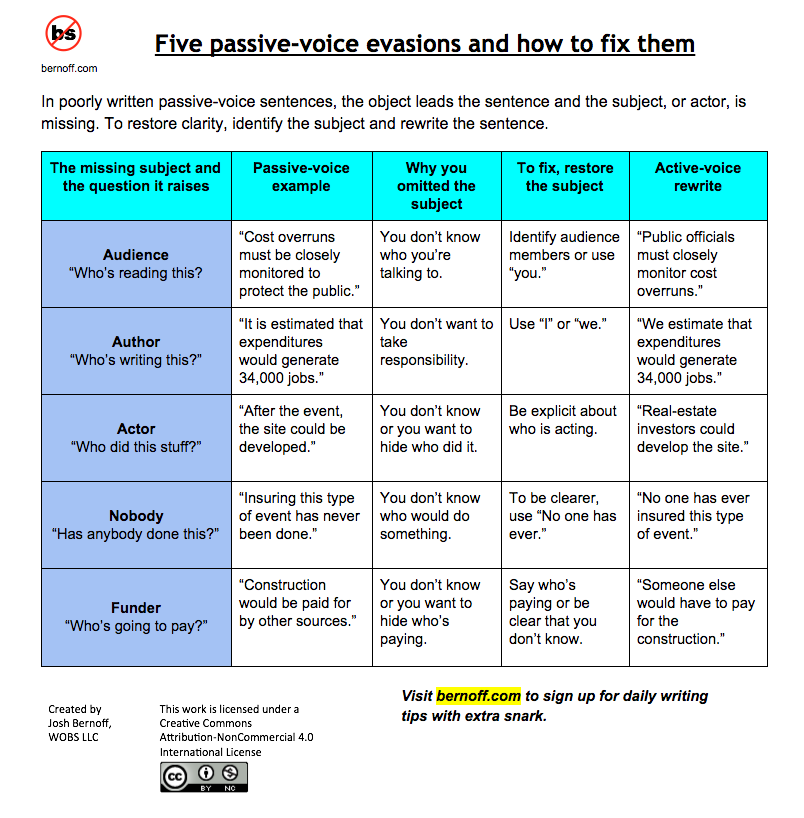5 passive-voice evasions and how to fix them
 We’re coming up on 100 years since William Strunk, Jr. told us to avoid the passive voice. What’s the big deal? Simply put: it makes the reader work harder. It hides the “who” in sentences, plunging the reader into a mysterious world in which things happen without actors or causes. Creepy! I’ll illustrate five common passive-voice evasions and how to fix them with examples from the controversial Boston 2024 Olympics bid.
We’re coming up on 100 years since William Strunk, Jr. told us to avoid the passive voice. What’s the big deal? Simply put: it makes the reader work harder. It hides the “who” in sentences, plunging the reader into a mysterious world in which things happen without actors or causes. Creepy! I’ll illustrate five common passive-voice evasions and how to fix them with examples from the controversial Boston 2024 Olympics bid.
What’s wrong with passive voice?
A passive voice sentence starts with the object of an action rather than the subject or actor. For example, in the sentence “Attention must be paid to the state of our nation,” who is supposed to pay attention? That’s the missing subject. Grammatically, passive voice sentences include the verb “to be” (is, was, ought to be) and a past participle, but it’s easier to just use the zombies test: if you can add “by zombies” after the verb and it still makes grammatical sense, it’s passive voice. (“Attention must be paid by zombies . . .”)
Passive has its defenders. I cannot resist quoting Wikipedia:
Although some purveyors of usage advice, including George Orwell (see Politics and the English Language, 1946) and William Strunk, Jr. and E. B. White (see The Elements of Style, 1919), discourage use of the passive in English, its usefulness is generally recognized, particularly in cases where the patient is more important than the agent
So Wikipedia justifies passive voice with a passive-voice sentence (shown in bold italic).
Passive has spread like an invasive plant through writing of all kinds. Here’s why you should root it out:
Every passive voice sentence sets up uneasiness in readers’ minds. They wonder what unseen force is responsible for the actions they’re reading about. The more passive, the greater the uneasiness.
Five common passive-voice evasions
The US Olympic Committee has designated Boston as the bidding city for the 2024 Olympics. Most people in Massachusetts are skeptical. Controversy always generates passives, so I was not surprised to find many in the economic analysis of the Olympics by the UMass Donahue Institute. The report includes examples of all five common passive-voice evasions:
- Who’s reading this?
- Who’s writing this?
- Who did this stuff?
- Has anybody done this?
- Who’s going to pay?
In the rest of this post, I’ll show you examples from the UMass Donahue Institute report and how to fix them. In each case, I’ll highlight the passives in bold italic.
Who’s reading this?
You want your audience to do something after reading what you write. But who is that audience? Passive obscures the uncertainty, even as it leaves the reader wondering who’s supposed to act.
[These] issues that will need to be closely monitored in order to ensure the public sector is protected from extensive financial commitments.
It can hardly be considered a “slam dunk” that tourism will increase in Greater Boston and Massachusetts over the long run from hosting the Olympics.
How to fix: Be explicit about who in the audience should act, or use “you.”
Public planners must monitor these issues to protect the public from financial commitments.
You can’t count on an increase in tourism from the Olympics.
Who’s writing this?
Authors use the passive voice to avoid “I” or “we.” This occurs most often in the most controversial statements.
[I]t is assumed that local revenue sources would have been spent in Massachusetts regardless of the Olympics.
The operations expenditures for the Boston 2024 Olympics are estimated to create or support nearly 34,000 direct jobs during the year of the Olympics.
How to fix: Use “I” or “we.”
We assume that regardless of the Olympics, local sponsors would spend in Massachusetts.
We estimate that a Boston Olympics would create or support 34,000 jobs in 2024.
Who did this stuff?
If you don’t know or want to hide who is responsible for some action, passive will do that for you. But your reader would rather know who did things.
[A]fter the Olympics, the Olympic Stadium site and Olympic Boulevard could be developed into seven million square feet of mixed use residential and commercial space.
In both the case of Los Angeles and Salt Lake City, . . . profits were used to help fund nonprofit organizations.
How to fix: Solve the whodunit mystery. Tell us who’s supposed to do this stuff:
Boston needs to find a real-estate developer who will develop the stadium sites.
The Los Angeles and Salt Lake City Olympic Committees gave their profits to non-profit organizations.
Has anybody done this?
Sometimes writers use passive when they have no idea who will actually do something.
To date, using insurance to protect a host city from cost overruns has not been used extensively.
As of this writing, no detailed funding plan [for moving the USPS facility] has been developed and it’s likely that the Commonwealth will seek significant federal funding.
How to fix: Be honest. Tell us that nobody has done these things.
No one has ever insured an Olympics against cost overruns.
There is no funding to move the facility; Massachusetts would need to fund it.
Who’s going to pay?
This economic analysis is rife with passive statements that obscure where the money is coming from.
Of this $3.7 billion [spent in Massachusetts], we estimate that $2.9 billion would be funded with money from outside of Massachusetts, thus representing a gain to the Commonwealth.
[Local Olympic Committee] revenue sources cannot be used to construct permanent or legacy projects for a region. Permanent construction associated with the Olympic Games would be paid for using other funding sources.
How to fix: Explain who will pay, or that you don’t know who will pay.
Visitors from outside Massachusetts will spend $2.9 billion of the $3.7 billion spent here.
Somebody other than Boston 2024 will have to fund the permanent construction.
—
For easy reference, here’s a chart about passives, why you use them, and how to fix them. To learn how to cure your passive-voice habit, see this post.
Thanks to Jeremiah Owyang for suggesting this post.
Graphic: Wikimedia Commons

The slipperiest passive of all time: “Mistakes were made.”
I don’t disagree with this article. The passive is to be assiduously avoided.
However, apparently direct nouns and pronouns like anyone, no one, or people are just as vague. For example, replace “the cost of plastic bottles is generally ignored” with “people tend to ignore the cost of plastic bottles.” Equally vague, and equally vaguely true. People who make plastic bottles or buy them wholesale certainly know the cost.
“The passive is to be assiduously avoided”? I hope you’re joking.
‘“The passive is to be assiduously avoided”? I hope you’re joking.’
Of course. In the vein of Churchill’s “up with this I will not put.”
exelente article, thank you for information
Since this thread refuses to go to its rest, let’s tackle “unclear.” This is my least favorite word that is heard in the news multiple times per hour.
E.g.: “The motives of the bomber are unclear.”
No. The motives are UNKNOWN.
– Jim Casey
I earn beer money by editing medical and scientific articles by Korean researchers that they have more-or-less translated into English. They seem stuck in the old culture of third-person passive being more objective, use it liberally, and object when I change it. Often, though, I’ll be chugging along through an article and find that the authors have suddenly switched to first-person active, only to switch back again a sentence or two later. Tough problem to address. Many Western scientific journals encourage active voice, but the English-language journals published in Korea still are in that older mind-set.